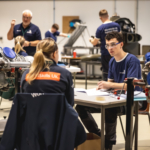New research reveals that parents and teachers view competitive activities as key to young peoples’ successful development and education.
More than nine in ten parents and teachers think it is important for all children to experience competition during their education 85% of those questioned think children who have no experience of competition will be in for a rude awakening when entering the world of work 94% agree that the experience of winning or losing during education prepares young people for later life 41 of the country’s most skilled young people named in Team UK to compete at WorldSkills São Paulo Successful Olympians are feted for their medal winning exploits, sports teams receive victory parades for successes on the field. But could a lack of competition during our education prevent us from achieving greatness, and receiving similar praise, at work?
A new research survey of 2,000 parents and teachers commissioned by Find a Future, which manages WorldSkills UK Skills Competitions, shows that the vast majority of parents approve of competition in schools, while more than half of the teachers questioned think that their schools could do more to offer youngsters the opportunity to compete. This contradicts the recent trends in education, where children’s participation in competitive situations has been reduced amid fears of creating too pressurised a learning environment. An overwhelming number of parents surveyed (92%) believe it is unrealistic for children to grow up thinking they will always be successful, since their real life experiences may be very different. Competition is also seen to help build the “soft” skills required to succeed at work – parents believe that children who have taken part in challenges will be more ambitious (51%), successful (41%) and better prepared for work (46%), whether they win or lose.
World Cup winning rugby star Will Greenwood MBE agrees that competition builds character which can only help lead to business success: “Competition makes you strive to be better – as an individual and as part of a team. Whether in the trading room of a financial institution, or on the rugby pitch, I have always believed it has improved my skills and my performance, which has been of benefit to me and to those around me. Without it, I certainly would not have reached my own personal goals, and been able to assist those around me to achieve at such a high level. “In any walk of life, experiencing success as an individual is a great motivator, and helps to breed a culture that strives to succeed whether in education or employment. Successful individuals generate excitement around them, which translate to improved performances as part of a group – either in education or business – and this in turn can only help to boost performances across the country as a whole: great news for the British economy in the longer term!” This new research is released to coincide with the unveiling of Team UK, a group of 41 talented young people who will represent the nation at WorldSkills São Paulo in August. There, the UK contingent will take on young people from all over the globe with the aim of being named the world’s best in their chosen skill.
As Carole Stott, chair of Find a Future – which manages the UK’s entry into the international WorldSkills Competition – explains, competition has a key role to play in building success from the classroom to the boardroom: “Many schools have, in recent years, moved their emphasis for children away from winning and losing to simply taking part. We believe this is detrimental both to the individual and to the wider community, since competition motivates ambition and increases performance standards among those involved, as well as their classmates. Importantly, competition also creates role models who other young people look to emulate, driving up standards and creating an upward cycle of success which is enjoyed by the individual, their school or employer and ultimately the nation as a whole. “For teachers and lecturers, the challenge of a competition brings fun and exciting new elements into teaching and training, making the experience more involving for all concerned. At a local, national and international level, participation in WorldSkills UK Skills competitions plays a vital role in raising standards, esteem and levels of expertise in further education and skills, rewarding exceptional talent.”
41 individuals have been selected to compete in São Paulo, in 37 skills ranging from landscape gardening to web design and welding. All were chosen based on a high personal skill level, competitive attitude and maturity, and have all received performance training from experts at Loughborough University, who have previously worked with talented individuals from the British Olympic team and England Rugby squad. Many of the team members started their journey to Brazil when they entered the WorldSkills UK Skills Competitions and competed in national finals held at The Skills Show, the nation’s largest skills and careers event, in Birmingham in 2013 and 2014.
Chris Hanson, who has been selected to compete in Construction Metal Work for Team UK, works for Richard Alan Engineering based in Yorkshire. “Being selected for WorldSkills São Paulo 2015 is an incredible honour and something I’ve been working towards for over two years. I’m not sure I would be as hungry for success and driven to be the best I can be if it wasn’t for exposure to competitions – and I would love to bring back the Gold Medal.” WorldSkills São Paulo takes place from 11 to 16 August 2015. To find out more about WorldSkills UK Skills Competitions, visit http://worldskillsuk.org.
Find a Future is the educational organisation which brings together WorldSkills UK Skills Competitions, The Skills Show and The Skills Show Experience, providing every young person with the chance to unlock their potential and get excited about the world of work. Through hands-on experiential events, skills competitions and a range of other activities, Find a Future helps to shape their futures and transform their lives.


